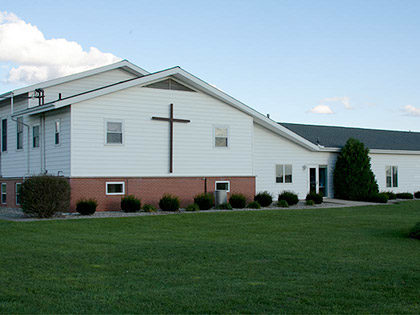Daniel 3:8-30
Introduction:
Baptismal Certificates
Brewer Support Info
Review:
Nebuchadnezzar – chose to disregard God’s word and pursue his own path. Majority of his subjects went right along with his decree.
Applied mostly to politics and our need to be careful of what cause we submit ourselves to, because our primary loyalty is to Christ.
Applies in other way. Ex: Jefferson Bible. Many people do this.
Link: This week, we’re focusing on three young Jewish men who chose to obey and follow God – no matter the consequences. Their names were Shadrach, Meshach, and Abednego.
Text: Daniel 3:8-30
Verses 8-12 – Accusation
“Chaldeans” – This term can refer to either Babylonians generally, the dominant ethnic group within Babylon, or a group of wise men. Because it could mean any of these, translators usually just leave it as “Chaldeans” rather than try to interpret. But, in this context, it’s most likely referring to a group of wise men.
There seems to be a bit of a dislike for Jews as a motivation here. They bring up the Jewishness of these three young men. They also are probably trying to curry favor from the king. Score some brownie points.
Notice what they point out here as why they think this should be a concern for Nebuchadnezzar: “they do not pay attention to you; they do not serve your gods or worship the golden image that you have set up.” They are basically playing on Nebuchadnezzar’s vanity. The point isn’t primarily about serving the right gods or worshiping the right image. The point is that by not doing these things, they aren’t paying attention to Nebuchadnezzar. Nebuchadnezzar doesn’t, primarily, care about the glory or honor of these minor gods or idols. He doesn’t seem much concerned about the glory and honor of the one true God, so why should he care about the glory and honor of these idols. He cares about his own glory and honor and people obeying him. By not worshiping these things, Shadrach, Meshach, and Abednego are not paying attention to Nebuchadnezzar, and that’s what he really cares about.
Verses 13-15 – Ultimatum
Well, Nebuchadnezzar reacts very typically, which is to say in a selfish rage. We probably could have predicted this reaction at this point.
Of all that he says, this is most notable:
“And who is the god who will deliver you out of my hands?”
Come on Nebuchadnezzar. Come on. You ought to know better than that by now. His intentions become even clearer with this statement. This drama is Nebuchadnezzar attempting to exalt himself above God. He doesn’t believe God can really fulfill the dream of the statue. He believes himself more powerful and influential than God.
And there is some great irony in this question, if you think about it. Nebuchadnezzar apparently doesn’t believe that any god is capable of stopping what Nebuchadnezzar wants to do. And yet, this whole drama is predicated upon the worship of an idol, but Nebuchadnezzar doesn’t even believe the gods capable of anything. Why then does Nebuchadnezzar insist on the worship of his gods and idols? If they can’t do anything at all to stand up to Nebuchadnezzar, if they are his creation, then they really aren’t worth worshipping at all are they? And yet he demands the worship of the golden image. This is because it’s not really about his gods and idols; it’s about him and his kingdom. It’s not directly stated, but it’s hard to miss. The Chaldeans appealed to his vanity, and Nebuchadnezzar’s speech has a whole lot of “I, me, and my” in it.
Verses 16-18 – Choice
Their answer is quite firm and bold. I hesitate to say that it’s out and out disrespectful. They do refer to him as “Nebuchadnezzar” and “O King.” But this phrase in particular is pretty pointed “we have no need to answer you in this matter.”
It means they aren’t going to answer his accusations or make any defense of their opinions. They don’t feel a need to explain themselves. And right they are to feel this way. Given all we know about Nebuchadnezzar, is there really any point in arguing with him about this?
Nope. One way or the other, they are going into that furnace, and they know it. The whole point behind it is Nebuchadnezzar seeking to exalt himself. And Nebuchadnezzar is certainly going to toss them into the fire to do it.
So, instead they challenge the king and his intentions directly. No argument or beating around the bush or talk about these false gods. They zero in on his statement that God cannot deliver them and they say “yes, He can and He will.” “But even if He doesn’t, we aren’t going to do as you have asked.” Yes, God can and will stop your plan Nebuchadnezzar, and even if He doesn’t, we would simply prefer death over your plan.
Verses 19-23 – Consequences
This is the angriest we’ve ever seen Nebuchadnezzar. He’s so filled with fury that his facial expression is altered in a noteworthy way and in hysteria he orders the furnace heated to such a degree that those who merely approach it are killed by it.
This was probably intended to increase their suffering, but really it just guarantees instant death. But Nebuchadnezzar obviously isn’t thinking very rationally right now so I don’t think he realizes that.
The people who cast the young men into the fire must have lived long enough to do the deed, but they died later. How soon we don’t know. They could have died immediately after or later from severe damage due to the burning.
Verses 24-27 – Deliverance
I think this is one of the coolest moments in the Old Testament. Here we see one of the strongest links between the Old and the New.
Nebuchadnezzar had three men thrown into the fire, but there were four inside and one of them had the appearance of a son of the gods. I think all or most of us can guess who the fourth man is.
This is the pre-incarnate Christ. That term “pre-incarnate” is one that maybe you haven’t heard before. Incarnate means in the flesh. So pre-incarnate means before He was in the flesh. Jesus came in the flesh when He was born of the Virgin Mary, but He existed long before that time.
John 1:1 says “In the beginning was the Word, and the Word was with God, and the Word was God.”
And Jesus says of Himself in John 8:58 “before Abraham was, I am.”
This is what the great Christmas song “Hark, the Herald Angels Sing” is talking about when it says “veiled in flesh the godhead see, hail the incarnate deity.” We sing the song, we love it, but it is in old English so a lot of us probably don’t know what it’s saying here. It means that divinity took on flesh. A member of the trinity took on flesh, and the godhead (which is another way of saying trinity) can be seen by looking at Jesus, though His full divine glory is veiled or obscured a bit by the fact He is in the flesh.
Here we see the Word, the great I am, come to protect and deliver these three young men from the fiery furnace. Shadrach, Meshach, and Abednego said that God would deliver them from Nebuchadnezzar’s hand. As it turns out, He personally comes to do so.
They were expecting God to deliver them, but ready to die in case He did not. Did they expect to have such a personal intervention? Probably not.
And Nebuchadnezzar was expecting this least of all. The Bible says that he was astonished and rose up in haste. The Hebrew word here means “to be amazed or alarmed. An attitude or emotion that shows either fear or awe.”
I think Nebuchadnezzar had reason to be amazed and to be filled with fear. Nebuchadnezzar has just been boasting about how no god can stop his plans. And now these three fellows that he is persecuting have been protected by what is obviously a deity of some sort.
Nebuchadnezzar decides he had better back pedal on this position real fast! He goes to the door of the furnace and declares “servants of the Most High God, come out, and come here!” In time I think Nebuchadnezzar will actually mean it when he says “Most High God,” but I don’t think he yet means it. You’ll see why I say that in the next chapter. But I think he is being motivated more by astonishment than anything else at this point.
Verses 28-30 – Vindication
But regardless of whether Nebuchadnezzar did or did not yet truly have a positive view of God, what he declares in verses 28-30 was very good for believers in the one true God.
Because of Shadrach, Meshach, and Abednego’s heroic stance, and even more because God intervened to save them, the religion of the Jews receives a nationally protected status from Nebuchadnezzar. And we know that if Nebuchadnezzar can be trusted to do anything, it is to tear people limb from limb and destroy their houses.
Such protections only last as long as the leader who grants them, and only as long as his mood dictates – but at least for a time the people of God will receive some respite from persecution and some freedom to worship their God.
And Shadrach, Meshach, and Abednego are promoted to a higher position, enabling them to be still more influential for protecting their fellow Jews and for being a positive influence for God.
Application:

